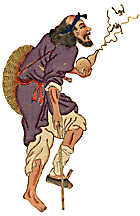
This page features deities, demigods/demigodesses, bodhisattvas and immortals from the pantheons of Taoism, Buddhism, Shinto, Hinduism and Bali-Hinduism.
This issue's featured immortal is...

Li T'ieh-Kuai (also known/spelled as Ti Kuai Li, Li Hung-shui) Is one of the more popular in a group of Taoist deities known as The Eight Immortals. He appears as an old beggar with a crippled foot. He uses an iron crutch and carries a wine gourd containing powerful medicines given to him by Lao-Tzu. Pictures of Li T'ieh-Kuai often portray him standing on the back of a crab or accompanied by a deer.
Li T'ieh-Kuai was originally an able-bodied mortal who lived in San-hsia during the Sui Dynasty. He was a great student of Taoism, and attracted the attention of Lao-Tzu, who appeared to him in disguise on a number of occasions in order to test his mastery of Taoist teachings. Each time, Li was rewarded for his piety. Finally, he was given the secret of Immortality by Lao-Tzu (or some say by Hsi Wang-Mu, the Queen Mother of the West and figure of great clout in the Taoist Celestial Realm).
Right before Li T'ieh-Kuai achieved immortality, he was summoned to the celestial realm for a meeting with Lao-Tzu. As was his custom, he sent his spirit on the journey, leaving his body in the care of a student with the instruction that if he hadn't returned in seven days, he had left for good and his body was to be cremated.
After his teacher had been gone for six and a half days, the student received a summons from his mother. She was about to die, and wished to see him one last time. Thinking that his master wasn't coming back after all, and not wishing to disobey his mother's dying request, he burned Li T'ieh-Kuai's body and set off for his village. On the way, he passed a dying beggar. The student couldn't save the old man, but did what he could to make him comfortable, then rushed to his mother's death bed.
Meanwhile, Li T'ieh-Kuai was finally returning home from his visit with Lao-Tzu. When his spirit arrived at his hut, both his body and the young student were nowhere to be found. Angered that his orders had been disobeyed, Li T'ieh-Kuai entered the nearest recently-deceased body he could find (that of the old beggar) and went to look for his disobedient student. Along the way, he was met by a messenger of Lao-Tzu, who fashioned for him an iron crutch and delivered the gourd containing an inexhaustible supply of incredible medicine (in some accounts, he also received a metal circlet).
When Li T'ieh Kuai reached the student's village, all around he saw the signs of mourning. Surmising what had happened, he walked straight into the student's house and up to the coffin containing the body of the student's dead mother. The crowd was incensed that this filthy beggar, unknown to anyone in the village, had the nerve to interrupt a wake and disturb the remains of the dead. But Li T'ieh Kuai, undaunted by the villagers' protests, pushed his way up to the coffin and poured some of the contents of his medicine gourd into the corpses mouth. The woman gave a violent shudder, loud cough, and sprang to life, confused by all of the commotion in her home. The "beggar" sought his student and explained everything to him. As he had acted in the spirit of filial piety, he was forgiven for burning Li T'ieh-Kuai's body before the seventh day. Later, this student, too, achieved great understanding of the Tao and rose to the rank of immortal.
Li T'ieh-Kuai roams the world curing the sick and coming to the aid of the poor and oppressed. His behavior is rumored to be quick-tempered and unpredictable, but his unmatched sense of justice and compassion for the downtrodden make him a popular figure of devotion in Chinese communities to this day. In association with the Eight Immortals, he is often seen as the joker or trickster. He is associated with the South and the Trigram Ch'ien, or Heaven. Li T'ieh-Kuai is the patron of pharmacists, who often hang an iron crutch outside their apothecaries as a sign of their profession. He is frequently invoked by healers and exorcists.
Anyone who is familiar with Chinese martial arts period films will undoubtedly have encountered the character of the old, lame gong-fu master. He lives in poverty and seclusion, is quick tempered and strict towards his young, lazy student, and loves to poke fun at villagers of high social or political standing. This archetype owes much to the legends of Li T'ieh-Kuai.
